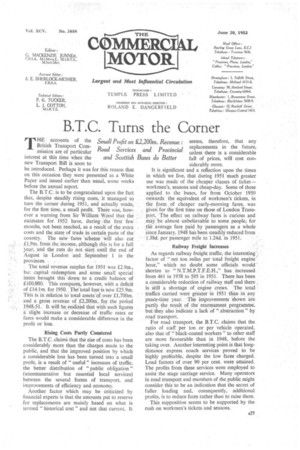B.T.C. Turns the Corner
Page 29

If you've noticed an error in this article please click here to report it so we can fix it.
Small Profit on £2,200m. Revenue: Road Services and Provincial and Scottish Buses do Better THE accounts of the British Transport Com mission are of particular interest at this time when the new Transport Bill is soon to be introduced. Perhaps it was for this reason that on this occasion they were presented as a White Paper and issued earlier than usual, some weeks before the annual report, The B.T.C. is to be congratulated upon the fact that, despite steadily rising costs, it managed tO turn the corner during 1951, and actually made, for the first time, a small profit. There was, however a warning from Sir William Wood that the estimates for 1952 have, during the first few months, not been reached, as a result of the extra costs and the state of trade in certain parts of the country. The new -fares 'scheme will also cut £.1,9m. from the. income, although this is for a full year, and the cuts do not start until the end of August it) London and September. 1 in the provinces. . , The total revenuesurplus for. 1951 was £2.9m., but capital redemption and some small special items brought this–clOwn to a credit balance of £100,000. This-compares, however, with a deficit of £14.1m. for 1950. The total lossis now £25.9m. This is in relation Id total assets I of over £1,700m. and a gross revenue of £2,200m. for the period 948751. It will be realized that with such figures a , slight increase or decrease of traffic rates or fares would make a considerable difference in the profit or loss.
Rising Costs Partly Countered The B.T.C. claims that the rise of costs has been considerably more than the charges made to the public, and that the improved position by which a considerable loss has been turned into a small profit, is a result of " useful " increases of traffic, the better distribution of "public obligation" (unremunerative but essential local services) between the several forms of transport, and improvements of efficiency and economy.
Another factor which may be criticized by financial experts is that the amounts put to reserve for replacements are mainly based on what is termed "historical cost" and not that current, It seems, therefore, that any replacements in the future, unless there is a considerable fall of prices, will cost considerably more.
It is significant and a reflection upon the times in which we live, that during 1951 much greater use was made of the cheaper classes of ticket— workmen's, seasons and cheap-day. Some of these applied to the buses, for from October 1950 onwards the equivalent of workmen's tickets, in the form ..of cheaper early-morning fares, was given for the first time on those of London Transport. The effect on railway fares is curious and may be almost unbelievable to some people, for the aVerage fare paid by passengers as a whole since-January, 1948 has been steadilY reduced from 1.38d. per passenger mile to 1.24d. in 1951: Railway Freight Increases As regards railway freight traffic, the interesting factor of " net ton miles per total freight engine hour," which no doubt some officials would shorten to " N.T.M.P.T.F.E.H.," has . increased from 461 in 1938 to 595 in 1951. There has been a considerable reduction of railway staff and there is Still a shortage of engine crews. The totaltraffic's carried were greater in 1951 than in any peace time year The improvements shown are partly, the result of the rearmament program-he; but they also indicate a lack of;" abstraction" by road transport.
For road transport, the B.T.C. claims that the ratio of staff per ton or per vehicle operated, also that of "black-coated workers" to other staff are more favourable than in 1948, before the taking over. Another interesting point is that longdistance express coach services proved to be highly profitable, despite the low fares charged. Load factors of over 90 per cent. were attained. The profits from these services were employed to assist the stage carriage service. Many operators in road transport and members of the public might consider this to be an indication that the secret of fuller loading and, consequently, additional profits, is to reduce fares rather than to raise them.
This supposition seems to be supported by the rush on workmen's tickets and seasons.




















































































